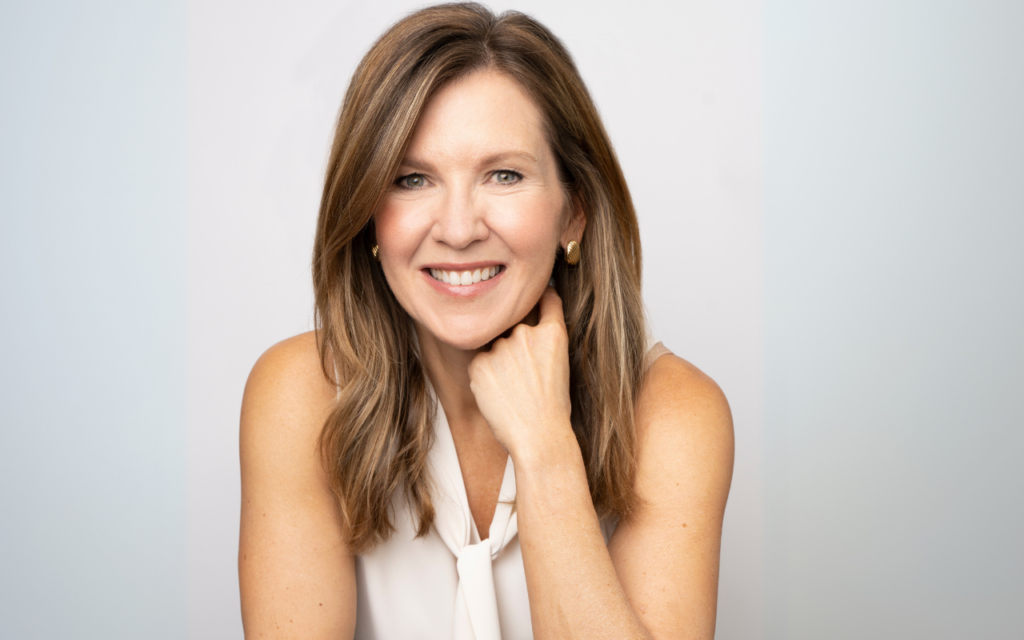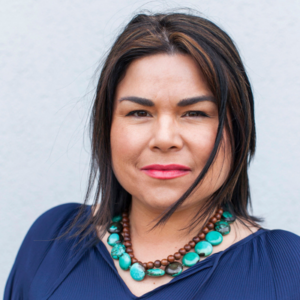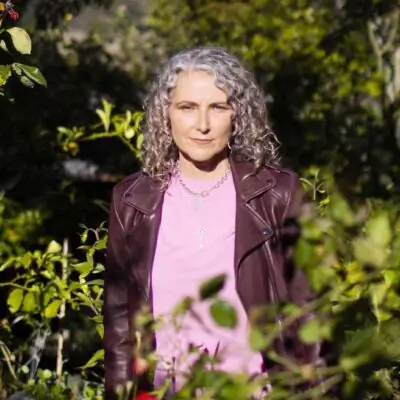Kris Depencier – RBC’s Executive Vice President, Regional Banking, Personal
Kris Depencier has been immersed in the financial world for almost her entire career, working her way through the ranks at RBC to become Executive Vice President, Regional Banking, Personal. But Kris’ dedication to helping clients achieve financial stability and success is matched by her deep investment in making positive change for all.
She has consistently worked to create safe, inclusive workplaces within RBC and initiated tough internal conversations about women’s health that help generate progressive change.

Catherine Clark: Kris, we’re so glad to have you here! You’ve had such an inspiring career. Can you talk to us a little bit about that career journey? Was it always your plan to have a career in the financial field, especially one that lasted as long as yours has and in one particular field?
Kris Depencier: You’re right. It’s been 30 years plus with RBC, and I have to admit, I didn’t think I would be a lifelong banker. It came about through a co-op that I had during my first and second year of my MBA with RBC. Honestly, I wasn’t even aware of what commercial banking or corporate banking would be like. That co-op allowed me to experience what it was like to work closely with commercial clients and business owners. I was very curious about what was behind their success and what was driving them personally.
I really loved the fact that there was a lot of accountability, and so I fell into it. And I sometimes wonder if we would be more successful in attracting more women into the industry if we provided more opportunities for women to experience what finance is like, particularly what commercial banking careers are like.
So it’s been a fun journey. It’s taken me to a lot of different places, but I look back and think it was one of the best decisions I made to join RBC.
Jennifer Stewart: Kris, I am going to take you back to the start of your career. If you could reflect on that young woman and her experience, what would you tell her now? What advice would you give her?
Kris Depencier: I would tell myself to put a lot less pressure on my desire to succeed. I feel like I put a lot of pressure on myself, and I was always worried about failing. I was always worried about meeting everybody’s expectations and about delivering. And I look back and think all that pressure was unnecessary. It was certainly excessive, and it created a lot of anxiety early on in my career.
If I could go back and talk to myself, I’d say, “Listen, you’ve got this. Nobody’s expecting you to be perfect. This is a long marathon, so make sure that you take some time along the way to enjoy your successes as you have them.”
I’m not sure I was as kind to myself as I could have been. You know, you always have that tape playing, and you’re evaluating and reevaluating how you did and what you could have done better instead of just spending a lot more time thinking about what you did really well.
Catherine Clark: Do you think that that quest for perfection is a gendered thing for women? Especially in a traditionally male-dominated field, do we tend to put those kinds of expectations on ourselves?
Kris Depencier: It can be. I’m sure there are many men who also set standards that might be hard for them to achieve and are putting a lot of pressure on themselves as well. But I think there is a high likelihood that a lot of women do it, particularly as they’re entering workplaces that may not have a lot of other women in them. I would say that was the case in the first role that I had at RBC. I think I was one of two women commercial bankers on the team out in Brampton. You really work hard to fit in. You’re looking around the table and seeing many other experienced commercial bankers, and you’re setting that same standard for yourself.
One of the other things, too, and something I’ve learned over the years, is that as you start in a new role, really recognize that the organization or the person that has hired you hasn’t hired you necessarily because you know everything that you need to know to do the job, or that you have all of the capabilities that the role requires. But more so that they see that you have a lot of the core experiences and the potential to learn and grow in that role and be able to, over time, achieve and exceed their expectations.
Jennifer Stewart: I’m curious about the notion of pressure, particularly pressure on women in the workforce. Kris, where do you think that pressure came from as a young woman? Do you think it was intrinsic and that’s just how you’re made, or do you think it was external from an experience, or trying to impress people around you?
Kris Depencier: It’s such a great question. I’ve thought about it a lot over the years. I think it’s a bit of both. I’d say internally, I’m wired that way, and I believe that even as a young woman, growing up as a child, I remember always wanting to do my best not to let people down, my parents down, you know, getting good grades. So I think some of that is hardwired, but part of it is the environment. You need to make sure that you stand out and that you’re going to get the attention that you deserve and want to be recognized for. I think that there is a high likelihood that when you’re in rooms and in environments where there may not be an equal representation of women and men, you will have to, or feel inclined to, put more pressure on yourself to be able to stand out and to be heard.
Catherine Clark: Did you have women in your life, Kris, or men you looked up to in a mentorship capacity, someone who helped guide you along the way? Is it still a part of your own life?
Kris Depencier: Well, for sure, there were lots of women and men, as I look back over my career that I think took an interest in my success, in my development, and who opened doors for me, or provided me with some direction in terms of different career options where I needed to focus my development energy.
What’s interesting, though, is if I think back, did I have what we would think of as a textbook mentor? I would say, no, I didn’t. I can’t put my finger on a relationship I had that I would consider a meaningful mentorship. And I think part of that; if I go back to the conversation we had earlier around advice I would give myself as a younger woman entering the workforce, I don’t think that I invested as much time as I could have in nurturing a lot of the relationships that I would have had the opportunity to have developed further within the workplace. I think back to so many missed opportunities to stay connected.
It’s often the advice I give to others: as you move about in an organization, really make those efforts to keep in touch with the people that have played a role in your success, or people that you’ve worked with, that you’ve really enjoyed spending time with, collaborating on projects, and in particular, you know, bosses, leaders in the organization that you’ve worked with closely that could continue to play an important mentorship role in your life.
That was a huge missed opportunity, and certainly one that I passed on to others as a key career learning for me. I love being able to be a mentor. It can take different shapes and forms. Sometimes, that’s a one-on-one relationship with someone you stay in touch with; sometimes, it’s different group forms. I have the practice of gathering a small group of really talented, diverse women that are within my downline that I don’t know as well as I would like to, and we’ll have several touch points throughout the year where we really talk about career and development, get to know each other a lot better, and, forge, which I hope will be a long term mentorship relationship.
Jennifer Stewart: I love that. But my question is, I think those circles and those mentorship opportunities are so incredibly important, but how do we continue to break down the barriers so that we’re not just talking about career and nine to five; that we’re talking about parenting and relationships and menopause and women’s health. How are you incorporating those kinds of broader conversations that, for so long, were taboo in the workplace?
Kris Depencier: One of the things that’s always been important for me is to make sure that you create an environment where people are comfortable. Part of that is ensuring that you’re building awareness and understanding of all attributes and perspectives that make every individual unique. When you do that, you get much more commitment and engagement.
One area that I’ve found interesting to support more conversations on is the topic of aging women’s health, which I also like to call menopause. For me personally, having gone through that experience without a whole lot of understanding of what this would entail, and learning as I’ve gone through menopause myself, just the kinds of struggles that women face – 80 per cent of women that go through menopause are going to have symptoms, 20 per cent of those are going to be really extreme and problematic. Of course, this is happening to 50 per cent of the population at a time when they are career-oriented and are really at the peak of where they are delivering and building upon their successes.
I want to bring that topic forward and ensure that all our leaders across RBC understand what women are facing. Creating forums for that kind of conversation makes the topic so that people are more comfortable tabling themselves, builds a lot more awareness and understanding, and, I think, unites all of us in trying to figure out how to create a more supportive environment.
So for me, for all leaders, actually, it’s just so important to put some of those tougher topics on the table, maybe topics that have a lot of stigma, topics that people may not be as comfortable talking about and it’s amazing that when you do that, how much more comfortable, how quickly and more easily people can put their own experiences on the table and feel like they can be themselves.










